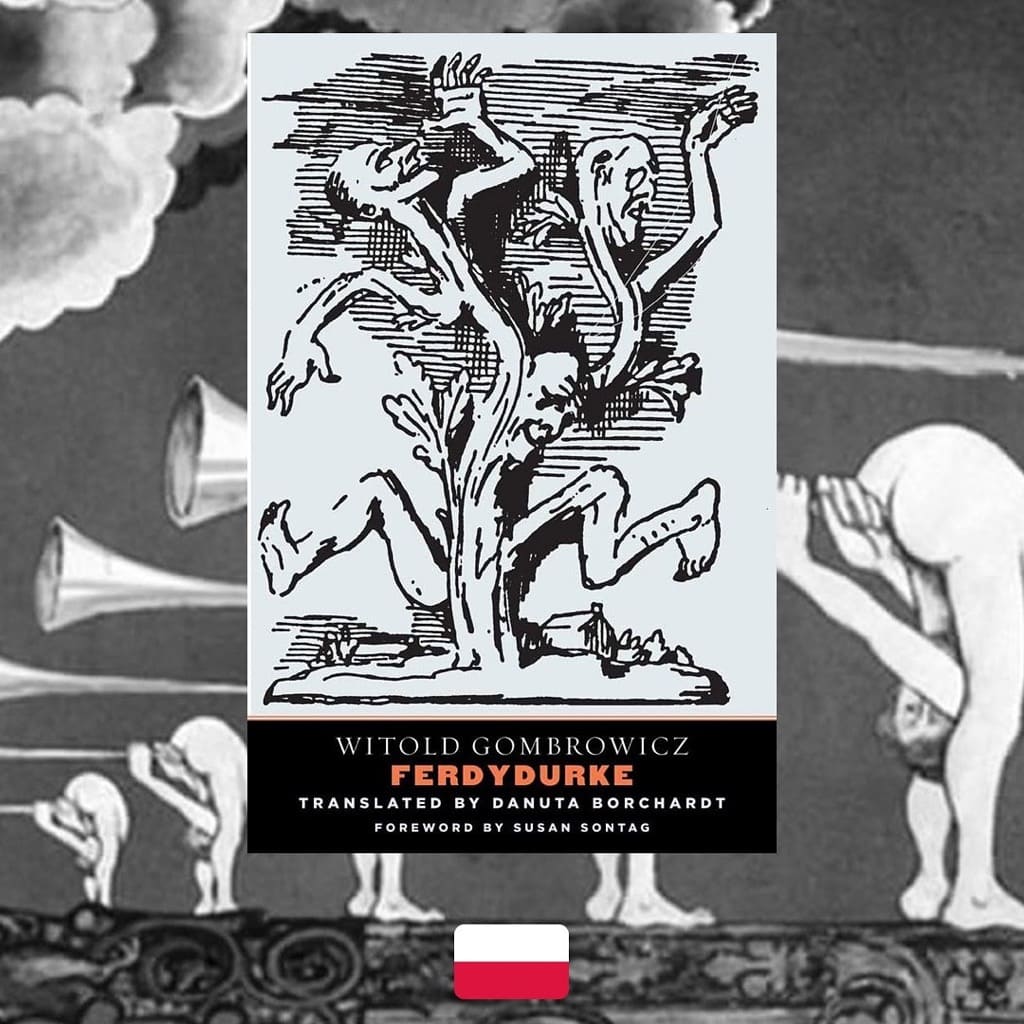Witold Gombrowicz: Ferdydurke, transl. Danuta Borchardt, Yale University Press.
Polish writer Gombrowicz was born into a well-off family who were probably not entirely pleased with him giving up his university studies to embark upon a literary career, especially when he persisted in producing absurdist, scandalous works such as Ferdydurke, his first novel, which scandalised Polish society of its time. Not long after its publication, at the start of the Second World War, he went into exile abroad and never got to see his homeland again, although he continued writing in Polish.
One of the key themes of his writing, which is apparent even in this early work, is about youth and immaturity, age and so-called wisdom, putting on masks and trying to escape the confines of society. He also is highly satirical about Polish nationalist rhetoric and elitism – and perhaps (as Susan Sontag says in the introduction to the edition that I have) all of the ‘sacred monsters’ (of being mature, cultivated, superior, discreet, reserved) have been thoroughly killed off in today’s obsession with youth, ‘authenticity’, openly sharing your opinions and emotions online with strangers etc.
And yet it remains a very strange, scurrilous and scandalous piece of work, with few direct interlocutors that I’ve read. The surreal events and sudden tonal shifts designed to shock remind me a little of Urmuz, while the meandering asides and non sequiturs are similar to Sterne’s Tristram Shandy. I can’t claim that I was always able to follow everything in the text, including some invented or repurposed language, which the translator takes care to explain in the Translator’s Note, but I was always eager to read more, to see what next bizarre flight of fantasy the author might be on.
The story in brief, if one can even attempt to summarize the plot: The narrator is a thirty-year-old writer who is still struggling to find his place in the world and find ‘maturity’. He gets abducted by Professor Pimko who turns him into a seventeen-year-old schoolboy and imprisons him in a boys’ school with other ‘immature’ youngsters like him. He is hosted by a family with a very modern girl whom he gets a bit of a crush on. And he befriends Kneadus, a vicious schoolboy who only dreams of corrupting young, good-looking farmhands. All the while, the narrator dreams of reverting back to ‘maturity’ and normality, but gets embroiled in all sorts of fights and farcical situations. I simply don’t know how to describe it any better – it’s hard to make sense of it all, a case of ‘you have to read it to believe it’.
There are many very quotable, witty passages, and they kept me going when the plot (and, let’s face it, at times blatant misogyny – whether the author’s or the characters’ is not entirely clear to me) confused me. At times you feel like the author predicted the rise of social media:
Mankind is accursed because our existence on this earth does not tolerate any well-defined and stable hierarchy, everything continually flows, spills over, moves on, everyone must be aware of and be judged by everyone else, and the opinions that the ignorant, dull, and slow-witted hold about us are no less important than the opinions of the bright, the enlightened, the refined. This is because man is profoundly dependent on the reflection of himself in another man’s soul, be it even the soul of an idiot.
There are plenty of sharp digs at the education system or the literary scene of his time, and I can’t help feeling that many of his darts still hit the mark. For example, this passage about readers’ attention spans:
…doesn’t the reader assimilate parts only, and only partly at that?… Quite often he’ll read a couple of segments then toss the book aside, not because he has lost interest in it, but because something else came to his mind. And even if he were to read the whole – do you think he can visualize it in its entirely and appreciate the relationship and harmony of its individual parts unless he hears it from an expert?… Here is the writer who with all his heart and soul, with his art, in anguish and travail offers nourishment – there is the reader who’ll have none of it, and if he wants it, it’s only in passing, offhandedly, until the phone rings. Life’s trivia are your undoing. You are like a man who has challenged a dragon to a fight but will be yapped into a corner by a little dog.
The digressions were sometimes the best part of all, for this is not a book to be read in a hurry. My advice would be: a chapter at a time, dipping in and out, enjoying the acrobatics.
To my great surprise, I discover that this book (which feels to me unadaptable) has been made into a film (see film poster above). I read this for Simon and Karen’s #1937Club, which runs throughout this week (or, in my case, for the whole month of April).



Great review! I only ever read one play of his while I was in college, but it was one I chose to write a final paper on. The novel sounds pretty full of life, too bad about the blatant misogyny, there have been eras when it seems men knew NO other way!
I mean, I do think his characters are supposed to be misogynistic as well, but he does sound harsh! I’m amazed you know him as a playwright and wrote about him! I hadn’t read anything by him prior to this, and only vaguely heard about him.
Funny, it was my last semester at Smith College. The course was taught by a wonderful prof who worked for Sundance and with Caryl Churchill. I remember I was drawing on a comparison of two plays. The other was an Ionescu. Rhinoceros, I think!
This sounds extraordinary! I’ve never heard of it so thank you for alerting me to it. I will look out for a copy.
I’d only ever vaguely heard of his name as an author, but I couldn’t resist ordering this book, often described as his masterpiece, when I saw it was suitable for the #1937Club.
Wow! Sounds most unusual, and quite a fine for 1937. I’ve not heard of either book or author but both definitely sound like one-offs!!!
I’ve been planning this #1937Club for a while and wanted to try some less well-known works in translation as well as the more obvious suspects. I’d not really heard of it before either!
I admit I’ve not read his work, Marina Sofia. But some absurdist work is really fine. And yes, it can be hard to offer a summary of this sort of a story, so I give you a lot of credit for that!
I didn’t even mention the chapters that were pure digressions and then digressions on digressions…
This does sound quite crazy, but the quotes are so current – I wonder if in his comments about readers he’s talking directly to us his readers, as if he’s throwing us a challenge?!
He really is, isn’t he?
It does sound intriguing and considering when it was written, that comment on shifting attention spans is so very relevant to the present.
I’ve never read any Gombrowicz – I always thought of him as quite wild which seems accurate! – but I do have the recent translation of The Possessed if I’m feeling brave enough.
You’ve picked out some good quotes. I’ve seem the movie. It pales in comparison to the book but it’s so weird it’s worth checking out. “Pornographia” and “Cosmos” are better novels, in my opinion. My favorite is “Cosmos”.
I read Bakakaï ten years ago and was left rather perplexed. In fact, I only have vague memories of a silly story involving a Countess and vegetarian Friday lunches. Like Mark above I enjoyed Cosmos a lot.
I’m impressed by the weird, DIY quality of the poster, and from your review of the book I do wonder how they managed to make a film out of it.
This does sound very unusual. Certainly not a novel, or author I had heard of before.
I tried to read this book for the club, too, but I didn’t get past page 70 or so. I just couldn’t take the juvenility in the school scenes and didn’t really find it very funny. You did much better at finishing it and finding some merit in it.
Oh my gosh, this sounds absolutely mad!